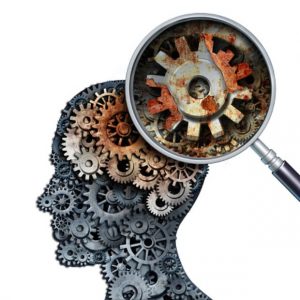Dementia is a condition characterized by memory loss and a decreased ability to think. The global prevalence of this condition typically affects those aged 60 and older with an estimated 3.5 million people around the world living with dementia as of 2010. We at Bel Marra recognize how difficult dementia progression can be, so we have compiled a list of our most up-to-date articles on the subject. You will learn how to spot the differences between age-related memory loss vs. dementia, as well as what the most common signs of dementia are to keep an eye out for.
Age-related memory loss vs. dementia
 There are times when we can’t remember where we placed our keys or the TV remote, or when we realize we have forgotten a person’s name. It can be embarrassing and isn’t something anyone would like to happen to them, especially in front of others. Being forgetful is usually synonymous with being old, as whenever a forgetful moment happens, it is referred to as “having a senior moment.”
There are times when we can’t remember where we placed our keys or the TV remote, or when we realize we have forgotten a person’s name. It can be embarrassing and isn’t something anyone would like to happen to them, especially in front of others. Being forgetful is usually synonymous with being old, as whenever a forgetful moment happens, it is referred to as “having a senior moment.”
Advertisement
While it is true that as we get older our memory isn’t what it used to be (it is an inevitable part of the aging process), all the important executive functions usually remain intact, with our mental abilities and cognitive skills being largely unaffected. Continue reading…
10 signs of dementia you need to know about
 Memory loss is a growing concern worldwide as populations continue to age. Rates of Alzheimer’s disease and dementia are climbing and are expected to double. As we age, there is some normal memory loss that we experience that is harmless. But how can you tell the difference between normal age-related memory loss and dementia?
Memory loss is a growing concern worldwide as populations continue to age. Rates of Alzheimer’s disease and dementia are climbing and are expected to double. As we age, there is some normal memory loss that we experience that is harmless. But how can you tell the difference between normal age-related memory loss and dementia?
Here are 10 signs that reveal your memory loss is something more serious and that you should see your doctor to be screened for dementia. Continue reading…
Loss of sense of smell linked to dementia development: Study
 Dementia is a term used to describe a group of symptoms affecting our ability to remember and think. The condition can be so pronounced that daily functioning, like the ability to cook for yourself and managing finances, can be negatively affected. An estimated 46.8 million people were living with dementia in 2015, with this number expected to reach close to 50 million by the end of 2017.
Dementia is a term used to describe a group of symptoms affecting our ability to remember and think. The condition can be so pronounced that daily functioning, like the ability to cook for yourself and managing finances, can be negatively affected. An estimated 46.8 million people were living with dementia in 2015, with this number expected to reach close to 50 million by the end of 2017.
The results of a new study have found that our sense of smell may be the key to identifying the elderly’s risk for dementia development. Continue reading…
Multitasking while walking a possible predictor of dementia: Study
Advertisement
 Dementia is a condition where a group of symptoms affecting memory, thinking, and social ability prevents a person from performing everyday tasks. This often leads them to become dependent on others. There is no definitive way to predict the onset of dementia, with most cases simply being diagnosed after the fact. A new study aims to change this by proposing a new method of testing involving our walking ability. Continue reading…
Dementia is a condition where a group of symptoms affecting memory, thinking, and social ability prevents a person from performing everyday tasks. This often leads them to become dependent on others. There is no definitive way to predict the onset of dementia, with most cases simply being diagnosed after the fact. A new study aims to change this by proposing a new method of testing involving our walking ability. Continue reading…
Dementia onset and progression may be slowed down by lifestyle changes
 A new study suggests that simple lifestyle changes may delay the onset of or slow down dementia. The researchers found that keeping your brain active through “cognitive training,” controlling your blood pressure, and regular exercise can go a long way in keeping your brain healthy.
A new study suggests that simple lifestyle changes may delay the onset of or slow down dementia. The researchers found that keeping your brain active through “cognitive training,” controlling your blood pressure, and regular exercise can go a long way in keeping your brain healthy.
CEO emeritus of the American Association for the Advancement of Science, Alan Leshner, explained, “At least two of those, we know, is good for a whole lot of other things that people do or that they could suffer from. That’s controlling your blood pressure if you have hypertension and engaging in physical exercise.” Continue reading…
